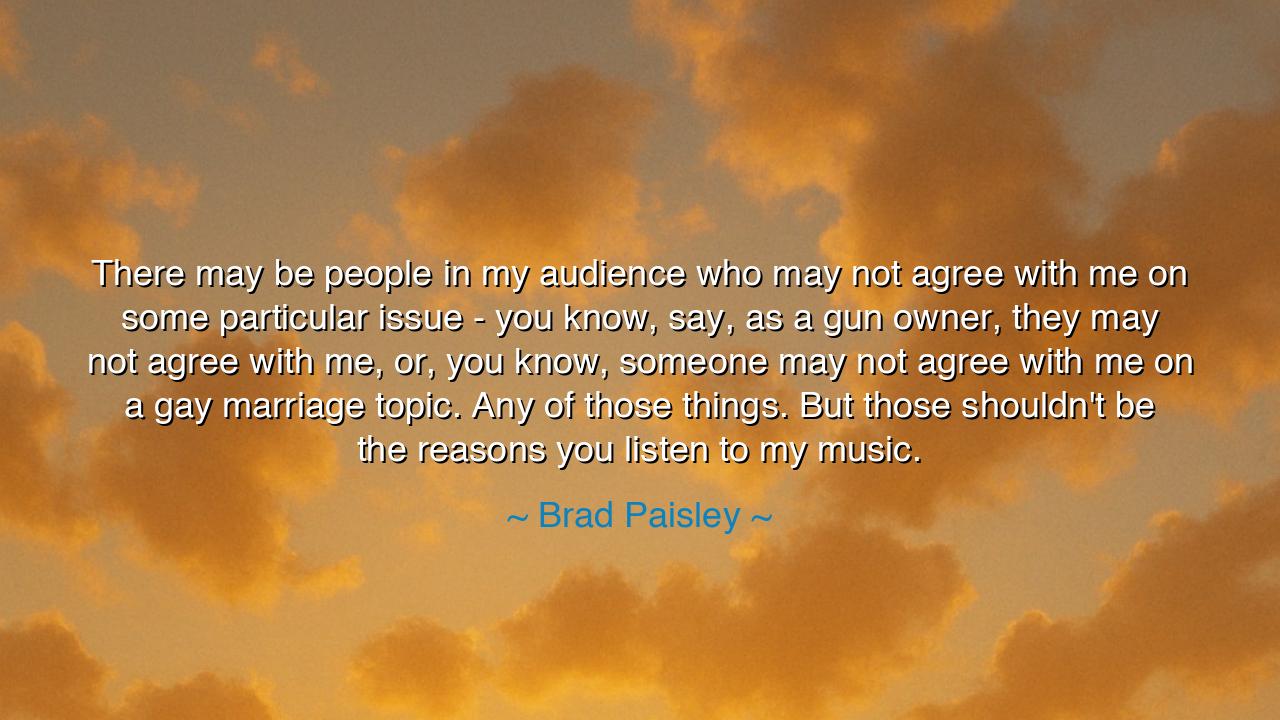
There may be people in my audience who may not agree with me on
There may be people in my audience who may not agree with me on some particular issue - you know, say, as a gun owner, they may not agree with me, or, you know, someone may not agree with me on a gay marriage topic. Any of those things. But those shouldn't be the reasons you listen to my music.






“There may be people in my audience who may not agree with me on some particular issue — you know, say, as a gun owner, they may not agree with me, or, you know, someone may not agree with me on a gay marriage topic. Any of those things. But those shouldn’t be the reasons you listen to my music.” — Brad Paisley
In this humble and thoughtful reflection, Brad Paisley, a country musician known for both his wit and sincerity, speaks to one of the deepest truths of art — that music, at its purest, transcends ideology. His words are not merely about songs or performance, but about the timeless role of the artist as a bridge between divided souls. Paisley’s belief that one should not listen to his music for agreement, but for connection, reminds us that art’s power lies not in conformity of thought, but in the unity of feeling. Through this statement, he calls humanity back to a sacred place — where the shared rhythm of the heart outweighs the noise of division.
From the ancient poets and storytellers to the troubadours and minstrels of old, music has always been a language that surpasses words. The ancients knew that song could tame anger, soothe sorrow, and bind nations together where politics could not. Orpheus, the mythical musician, was said to charm both beasts and gods with his lyre — not because they agreed with him, but because his art touched something beyond debate. So too does Paisley remind us that in an age of argument, art remains one of the last sanctuaries of communion. When we listen to a song, we do not ask whether its creator shares our beliefs; we ask only whether it moves us — whether it speaks to that eternal part of ourselves that longs to be understood.
Paisley’s mention of issues such as gun ownership and gay marriage shows that he understands the fractures that run through modern society. These are not small matters; they cut deep into personal belief and identity. Yet, by naming them, he exposes a profound truth — that our differences, however fierce, should not define the totality of our relationships. There can still be fellowship, still respect, still admiration. The music, then, becomes a symbol of what human connection could be if we learned to listen, not to reply, but to feel.
There is a story from the American Civil War that illustrates this principle. One evening, across the dark fields where Union and Confederate soldiers faced each other, a lone musician began to play his violin. The sound drifted through the smoke and sorrow, and soon, from the other side, another answered. For a few precious moments, the battlefield was silent except for music — no uniforms, no enemies, only men remembering their shared humanity. When the last note faded, they returned to their positions, but something within them had shifted. This is the miracle of art: that even in the heart of division, it reminds us of our common soul.
Paisley’s words, then, carry the weight of that ancient wisdom. He is not rejecting conviction or belief — for every artist, like every person, must live by principle — but he is urging listeners to see beyond them. In the realm of music, there is no left or right, no for or against; there is only truth expressed in melody. A song that speaks honestly from the heart cannot belong to one side alone; it belongs to all who can feel its truth. When people judge an artist only by their stance and not by their song, they rob themselves of the very essence of art — its power to unite what life divides.
In this, Paisley’s philosophy aligns with the timeless teaching that the artist’s duty is not to preach, but to reveal. Just as the prophet does not force faith, but awakens it, so the musician does not demand allegiance, but evokes recognition. The greatest art does not tell us what to think — it shows us what it means to be human. And in that space, where melody meets meaning, differences dissolve, if only for a moment, into harmony.
Let this be the lesson preserved from his words: listen with your heart before your judgment. Let art be a bridge, not a weapon. When you hear a song, a poem, or a story, do not ask whether you agree — ask whether it makes you feel, whether it awakens something honest within you. For in listening beyond division, we rediscover the truth that all creation — every voice, every melody — springs from the same source. And when we remember that, even briefly, the world becomes once again what it was meant to be: a chorus of souls, distinct yet united, each singing its part in the grand song of life.






AAdministratorAdministrator
Welcome, honored guests. Please leave a comment, we will respond soon